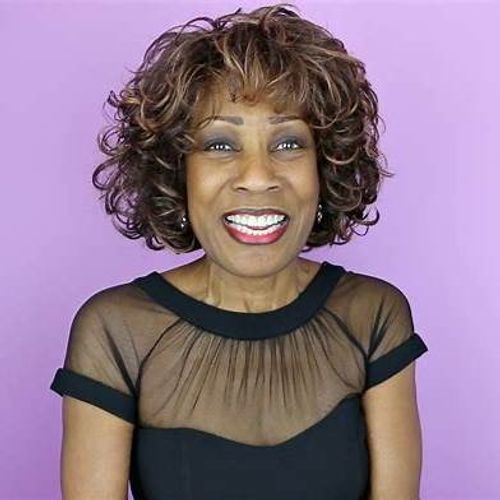Mom, a White Man, and Midnight: A Journey of Love and Acceptance
Wambui Bahati takes us on an unforgettable midnight adventure as she introduces her future husband to her mother in North Carolina, highlighting the delicate dance of love and secrecy in the face of societal tensions. In a time when interracial relationships were often met with raised eyebrows, Wambui’s mom cleverly orchestrates a late-night rendezvous to keep their visit under wraps. Picture this: a cozy gathering filled with mouthwatering homemade dishes, where the warmth of family and the complexities of acceptance collide. As Wambui shares her heartfelt story, we delve into the challenges of bridging cultural divides, all while enjoying some good-natured laughs and delicious sweet potato pie. Join us as we explore how love can flourish in the shadows, and perhaps learn that sometimes, the best moments happen when the world is fast asleep.
Embark on a poignant journey with Wambui Bahati as she recounts a memorable trip back home to North Carolina as a young adult amidst the complexities of interracial relationships during a transformative era. In this heartwarming yet thought-provoking episode of "70 Years and Beyond," Wambui shares the story of introducing her future husband to her mother under the cloak of night, navigating the societal tensions and family dynamics of the time. Through a midnight meeting filled with delicious homemade cuisine and heartfelt conversations, discover how love, secrecy, and her mom's desire to keep a secret unfold.
______________________
Returning to North Carolina, Wambui Bahati embarks on a journey filled with laughter, love, and a touch of secrecy as she introduces her future husband to her mother. In this engaging episode, we dive deep into the dynamics of an interracial relationship during a time when societal norms often dictated otherwise. The narrative unfolds with Wambui’s humorous recollection of the multiple phone calls with her mother, each filled with increasingly elaborate excuses as to why they couldn’t meet until midnight. From church meetings to hair appointments, her mother’s insistence on secrecy sets the stage for a unique family reunion.
When Wambui and her husband finally arrive at her childhood home, the atmosphere shifts from suspense to warmth as they are greeted with a feast fit for royalty. Wambui’s mother pulls out all the stops, showcasing her culinary prowess with dishes that evoke nostalgia and love. The contrast between the covert nature of their visit and the hearty welcome they receive highlights the complexities of familial love intertwined with societal pressures. Wambui's observations about her mother’s demeanor reveal a woman who is both protective and nurturing, eager to welcome her daughter's partner while also keenly aware of the potential judgments from their community.
As the night winds down and they prepare to leave, Wambui has a moment of clarity about her mother’s motivations for the midnight meeting. The episode culminates in a thoughtful reflection on love, family, and the lengths to which we go to protect those we care about. In a world where relationships often face scrutiny, Wambui’s story is a heartwarming reminder of the enduring power of love and the importance of family bonds that transcend societal boundaries.
Takeaways:
- Wambui Bahati's story illustrates the complexities of interracial relationships in a transformative era, showcasing love amidst societal tensions.
- The midnight meeting between Wambui and her mother adds a layer of secrecy that highlights their family dynamics during a pivotal moment in history.
- Homemade cuisine serves as a powerful symbol of love and connection, as Wambui's mother prepares a feast to welcome her daughter's future husband.
- Through humor and heartfelt anecdotes, Wambui shares how navigating family expectations can be tricky, especially when love crosses cultural boundaries.
- The episode emphasizes the importance of understanding and acceptance in family relationships, showcasing how love can bridge divides.
- Wambui's mother's insistence on secrecy reflects the societal pressures of the time, making their midnight rendezvous a poignant metaphor for hidden love.
Transcript
Well, at least one.
Speaker A:See one.
Speaker A:Yeah, at least one of my husbands was a white man.
Speaker A:Okay, so we were going to be making a move from New Jersey to California.
Speaker A:And on that trip I suggested that we come down from New Jersey to North Carolina first before we go across country California.
Speaker A:And that way he could meet my mother.
Speaker A:I wanted my mother to meet him.
Speaker A:Okay, So I had called my mother and I told her the date, the day when we would be there.
Speaker A:And that day came and I called her early in the morning and I said, hey mom, we're in town.
Speaker A:We're going to come over at about 11, is that okay?
Speaker A:11 in there?
Speaker A:And my mother said, wait, hold up now.
Speaker A:11?
Speaker A:No, no, okay, okay, I want you to come, but 11 is not a good time.
Speaker A:Why don't you come a little later?
Speaker A:And so I said, well, great, and how about noon?
Speaker A:She said, oh, no, no, no, no.
Speaker A:You see, I'm going to have a meeting at church at noon.
Speaker A:And you know, with the alert circle is we're going to be meeting at church at noon and so don't come.
Speaker A:I don't want you to come and I won't be here, so could you come a little later?
Speaker A:I said, well, great, well, how about two?
Speaker A:She said, now two would be good, but two, let's see.
Speaker A:You see, you don't know how long these meetings can go on.
Speaker A:You know, once we start a church meeting, that meeting can go on and I don't want you to come and I'm not here, so come a little later.
Speaker A:I said three.
Speaker A:She said, well, sometimes when the meeting is over, there's a certain ladies that I give a ride home, so it might take a little longer.
Speaker A:And I said, well, okay, so why don't I just come at five?
Speaker A:She said, five o'clock?
Speaker A:Oh, girl, I, I, I didn't tell you I had a hair appointment.
Speaker A:This is my hair day and Ms.
Speaker A:Jameson's gonna be waiting for me.
Speaker A:If I cancel right now, I still got to give her part of the pay.
Speaker A:That's the agreement we have.
Speaker A:So I'm gonna go ahead and get my hair done.
Speaker A:That's gonna be at 5:00.
Speaker A:So 5:00 I'm gonna get my hair done.
Speaker A:And so come after that.
Speaker A:I said, okay, how about seven?
Speaker A:And my mom said, seven.
Speaker A:Okay, you know what, what we're going to decide at the meeting at noon at the church is whether we're going to come back to the church at 8:00 because you know, our annual fashion show is only let's See, I think we got next Sunday.
Speaker A:That's the next Sunday night is the annual fashion show.
Speaker A:So we got to kind of rehearse, see where we're going to put everything, check out how we're going to decorate and things like that.
Speaker A:So at 8 o'clock we're probably going to have to go back to the church to see the decorations, to see what kind of things we're going to be doing for the fashion show this year.
Speaker A:And that's the only time we can really get in that space.
Speaker A:Space where the fashion show is going to be.
Speaker A:And so I think you should come a little late because I don't want you to come and I'm not here.
Speaker A:I said, well, 10 o'clock.
Speaker A:She said, well, 10 might be good, but like I say, I still give a lot of people rides home, especially at night.
Speaker A:I said, mommy, you're gonna be sleep.
Speaker A:You, you're not even going to be awake at 10 o'clock.
Speaker A:She said, oh yeah, I'm gonna be awake because, because we're rehearsing for the, for the fashion show and I got to be there.
Speaker A:So here's what, here's what I want you to do.
Speaker A:I said, mama, why don't I just come at midnight?
Speaker A:She said, that's perfect, come at midnight.
Speaker A:I said, mama, you're not going to be up at midnight.
Speaker A:She said, you come at midnight.
Speaker A:Yes, that'll be perfect because I don't want you to come and I'm not here.
Speaker A:So you come at midnight.
Speaker A:I said, okay.
Speaker A:So we went to my mother's house at midnight.
Speaker A:When we drove up to her house, it was very dark.
Speaker A:Now usually when my mother was expecting someone, she had a porch light that she would turn on.
Speaker A:It was very bright light.
Speaker A:You could see almost the whole yard when she turned on that light, but it was dark.
Speaker A:I could see her car in the driveway.
Speaker A:But even inside the house, everything looked dark.
Speaker A:I said, I bet you my mother is sleeping.
Speaker A:So I got to the door and I rang the doorbell.
Speaker A:Nothing.
Speaker A:I rang it again.
Speaker A:I start tapping on.
Speaker A:It's that one of those doors that has the screen door on the outside.
Speaker A:Then it has a regular door inside, but both of those doors were locked.
Speaker A:So now I'm tapping on the door and then I hear motion, I hear movement, but I don't see any lights coming.
Speaker A:Come on.
Speaker A:I just hear motion and movement.
Speaker A:Now this is the house that I grew up in.
Speaker A:It's a very small house, small rooms, two bedroom and a den, a living room, one bathroom, small kitchen.
Speaker A:Not even an eat in kitchen.
Speaker A:It's a small house, so it's not like someone has to come from another wing to open the door.
Speaker A:But I hear her, and she's like, slow.
Speaker A:Everything motion is slow.
Speaker A:I hear very slow motion, but no lights.
Speaker A:And then finally she gets to the door, and I hear her say, is that y'all?
Speaker A:I said, yes, mom, it's us.
Speaker A:Then I hear her take the chain off the door, undoing the locks.
Speaker A:And she does the screen door lock.
Speaker A:And she opens the door.
Speaker A:She says, come on in here.
Speaker A:Come on in here.
Speaker A:And so we go inside in the dark, and she closes the door.
Speaker A:Then she turns on the lights.
Speaker A:And she says, I'm so glad y'all could come.
Speaker A:I know I had so many things to do today, but I'm glad that you're here.
Speaker A:And she says, I'm so glad to meet you.
Speaker A:And she says, look here, I want y'all to just have a good meal before you start your journey.
Speaker A:And I looked over at the table.
Speaker A:My mother must have been cooking all day.
Speaker A:I don't know what she was doing, but she had a spread like it was two Thanksgivingses.
Speaker A:And she says to him, you ever had yourself a sweet potato pie made from scratch by somebody who lives in North Carolina?
Speaker A:And he said, no, ma'am.
Speaker A:She said, well, you're going to have some tonight.
Speaker A:Everything you see there, I made from scratch.
Speaker A:Any vegetables you see over there, I grew those in my garden.
Speaker A:I know you going to like it because I made all that stuff myself.
Speaker A:She made plates for us, and we were eating, and the food was delicious.
Speaker A:And my mother was just.
Speaker A:I'd never seen my mother that smiley, that genuinely.
Speaker A:She just seemed genuinely happy, and she just was so cordial.
Speaker A:Now, my mother is a cordial person.
Speaker A:She's nice to people, or at least she knows how to put on that nice thing.
Speaker A:But I'd never seen her this giddy and happy and just nice before.
Speaker A:And she.
Speaker A:She was just saying, I hope that I can come visit you.
Speaker A:I hope I'm welcome to come visit you when you move to California, and I hope you have a good trip and that everything goes well.
Speaker A:And she just kept saying over and over, it certainly is nice to finally meet you.
Speaker A:It certainly is nice to finally meet you.
Speaker A:You seem like a right nice fella.
Speaker A:You seem like a right nice fellow.
Speaker A:And I was like, whoa, what happened to my mother?
Speaker A:My mother is usually a little.
Speaker A:Now it was a white man that she was talking to, but we had grown up kind of understanding that you don't judge a person by their skin color.
Speaker A:In fact, when we used to go to the civil rights marches downtown in Greensboro and back in the 60s, my mother would say to me and my sister, she'd say, now, remember, just because somebody looks like you doesn't mean they're for you.
Speaker A:And so we'd always believe that and taken that into account.
Speaker A:And so we always were taught to judge people not on their skin color, but on their character.
Speaker A:But my mother here was just going a little bit overboard.
Speaker A:But anyway, when the two hours were passed, it was like a little after two when I said, okay, you know, we're going to go now.
Speaker A:And so my mother said, well, I'm so happy that you could come and visit.
Speaker A:I just am so happy you were able to come and that I could meet this fine young man.
Speaker A:And I know everything's going to be good.
Speaker A:I'm going to be praying for y'all.
Speaker A:And so she walks us to the door, and then when we get to the door, she turns out the lights, and she says, okay as she's opening door.
Speaker A:Y'all have a safe trip.
Speaker A:Let me know when you get there now, okay?
Speaker A:And so we're walking out in the dark where there's a light switch right by my mother's hand.
Speaker A:All she has to do is flick it, and there will be light on the porch and light outside, but she doesn't turn it on.
Speaker A:And so she says, bye.
Speaker A:Bye.
Speaker A:We are waving to her in the dark.
Speaker A:My mother actually closes the door.
Speaker A:Me and him are standing there in the dark.
Speaker A:And it was when I got to the bottom step of the porch that I realized it hit me what my mother was doing.
Speaker A:You see, my mother didn't want the neighbors to see me coming in with a white man any more than she didn't want the neighbors to see me leaving her house with a white man.
Speaker A:And so that was her way of kind of not letting the neighbors know what is going on as far as me having this white boyfriend that is about to be my husband.
Speaker A:So in order to keep the neighbors out of her business, she just told us, come at midnight, kept everything dark, come in in the dark, leave in the dark.
Speaker A:And that way, nobody could see that I was coming and going with a white man at her house at 615 Julian street in Greensboro, North Carolina.
Speaker A:My mom.
Speaker A:I confronted her a few years later about that incident and why we were coming at midnight.
Speaker A:And you know what?
Speaker A:She confirmed it.
Speaker A:Mm.
Speaker A:My mom.




